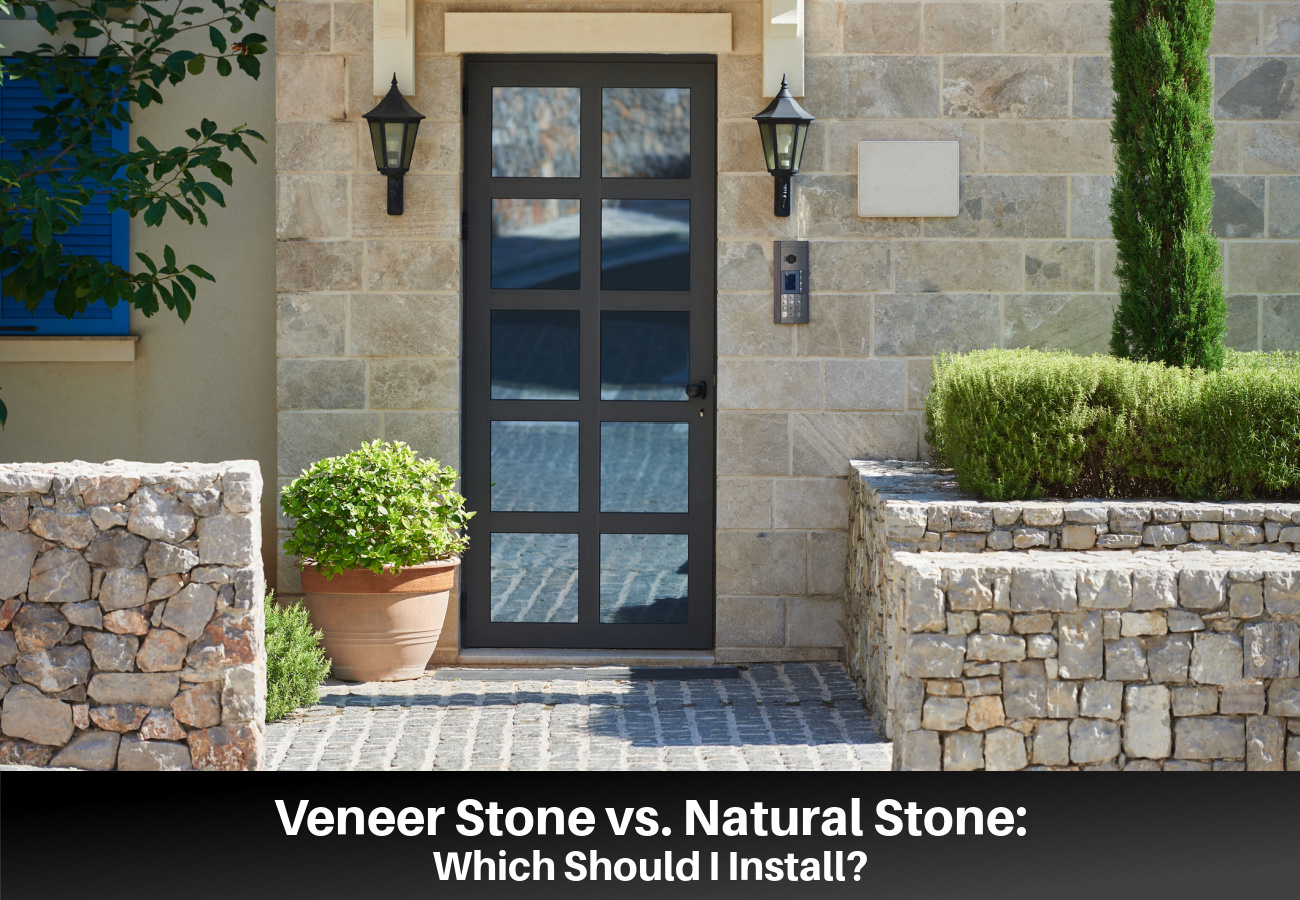Natural stone and veneer can both provide an organic look to exterior and interior projects. Their biggest differences are in price, structural stability, and installation methods.

Natural stone forms in the earth’s crust as the result of thousands of years’ worth of heat and pressure forming sand and minerals together.
Some of the most popular types of natural stone include granite, marble, quartz, feldspar, mica, limestone, travertine, sandstone, and slate. Each type of stone has a different hardness level which indicates its durability. Before choosing a type of natural stone, you should compare its hardness on the Mohs Hardness Scale.
Pros:
Low maintenance needsUnique and authentic appearanceStrong, durable, and high resistance
Cons:
HeavyExpensive
Veneer stone is a manufactured product that mimics the appearance of natural stone. The main components of veneer stone include cement, iron oxide, and aggregates. These materials undergo molding and coloring to create a final product that resembles natural stone.
Pros:
LightweightEasier to cut and shapeCheaper materials and installation than natural stoneManufactured stone veneers offer uniform style and color
Cons:
Prone to chipping and color fadingNot strong enough to be used structurally for building applications

Veneer faux stone siding costs $6 to $18 per square foot, depending on type and brand. Natural stone siding costs $25-$50 per square foot.
Natural stone needs less maintenance than veneer stone. It’s less porous and doesn’t need sealing. Veneer stone is more absorbent. It requires regular sealing to prevent staining and water damage.
Natural stone boasts more durability and resistance than veneer stone since it undergoes hundreds of years of formation processes, rendering it solid and durable. Natural stone withstands heavy foot traffic and extreme weather conditions.
Veneer stone is a manufactured product designed to be lightweight. As a result, it’s less rigid and durable.
Natural stone has a unique and varied texture that forms through its natural formation process. A natural stone’s texture ranges from smooth to rough depending on the type of stone and the quarry’s location. Veneer stone lacks the same depth and variation since it mimics the texture of natural stone.
Natural stone is available in white, beige, gray, brown, black, and red. The color depends on the minerals present and the quarry’s location. Veneer stone is also available in various colors. Veneer stone, however, has a more uniform color and is less varied than natural stone.
Natural stone is thicker than veneer stone, making it more suitable for load-bearing applications. Veneer stone is much thinner, lighter, and unsuitable to support weight. It’s ideal for use on interior walls or exterior cladding when covered.
The lightweight nature of veneer stone makes it easier to handle and install. Natural stone is heavy and requires specialized equipment and skilled labor to install.
Natural stone requires masonry techniques, such as laying stones in a specific pattern and filling the joints with mortar.
Veneer stone, on the other hand, uses an adhesive for installation. The installation method makes it insufficient for structure weight support but ideal for DIY.
Veneer stone is available at most home improvement stores. Natural stone is more difficult to source and requires placing a specific order.
Natural stone is solid enough to support the weight of a structure. It’s ideal for load-bearing walls and other structural applications.
Veneer stone isn’t strong enough to support the weight of a structure. Veneer is ideal for decorative purposes. Installing veneer stone on drywall, plywood, or sheathing is easy.
Natural stones are rugged and have a high resistance to weather conditions. They’re more suitable for exterior walls than veneer stone. Natural stone is also less porous, making it less prone to deterioration over time. Limestone is used for exterior siding in homes due to its attractive appearance and durability.
Granite is a durable hardscape material with a low absorption rate and high fire and heat resistance. It’s rated 6 or 7 out of 10 on the Mohs Hardness Scale, making it a popular choice for outdoor spaces.
Veneer stone is best for outdoor applications that need extra support. Manufactured stone veneer siding is lightweight and unsuitable for load-bearing applications. It’s suitable for various applications such as facades, retaining walls, outdoor fireplaces, and accent walls.

Gisele Bundchen's contemporary twist on this emerging design trend is the talking point of her kitchen
Zendaya taps into the subtle power of this accessory to ensure her neutral living room is never boring
Amazon has become a go-to for chic home decor – here’s what we’re shopping from the 2024 Spring Sale
This designer's 'every seat needs a surface' rule has changed my living room layout forever – here's what I mean
5 designer Amazon storefronts that make shopping for stylish homeware so much easier
Joanna Gaines' 'mesmerizing' garden is the perfect example of how to grow cut spring flowers at home
Tan France opts for this stabilizing color palette to 'ground' his guest cottage, experts say
Shark's St Patrick's Day sale is here - and you can save $100s on vacuums and air purifiers
Matthew and Camila McConaughey's raw cabinets possess a texture and warmth that's replicable in our kitchens
What is Hemlock Wood?
CDX vs. OSB: What Is the Right Choice for You?
What Is OSB and Why You Should Use It
What Is a Composite Roof?
Everything You Need to Know About PVC Roofing
Applications and Benefits of Ponderosa Pine
Is Western Red Cedar Right For Your Home?
What is EPDM Roofing?
Understanding the Benefits and Applications of Mass Timber
What is Hemlock Fir: Uses and Benefits